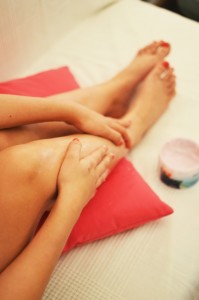As a writer, some of your best material comes from your body. Using all of your senses, every day will infuse your writing with rich details and believable depictions of events and emotions.
I’ll give you a concrete example. I love getting massages. In my story “Beautiful Bones,” published in the Connecticut Review, I conglomerated various massage experiences and settings to provide a detailed and sensuous description of a massage to accompany the recipients thoughts and anxieties before turning to magical realism at the end. I call this a case of direct application, in which a character is having the experience I drew upon to describe it.
But consider the use of indirect application: you could just as easily incorporate many massage moves into the description of a sex scene. Or consider the case of a waitress whose partner offers a foot rub after a long day at work.
For any experience, try to note as many of your senses as possible.
What happens when you are angry? What happens to your heart rate, breathing, stomach? Do you blush? Go white around the lips? Does your body tense? Which part(s)? What happens to you voice—everything from pitch to loudness to speed of speaking. Now consider someone you know well: how do you know when s/he is angry? What are the visual and auditory cues?
Food and drink are more than taste!
In fact, eighty percent of taste is actually smell. When olfactory cues are absent, people can’t tell the difference between bits of apple and bits of onion. And then there are the issues of temperature, texture, and spiciness. How complex is the experience?
For writers, everything is material.
Whether it’s a walk in the woods, giving blood, taking a taxi from the airport to a hotel, the frustration of tax time, or just being bored out of your skull, pay attention and use your experience.
How has an experience shaped your writing?



